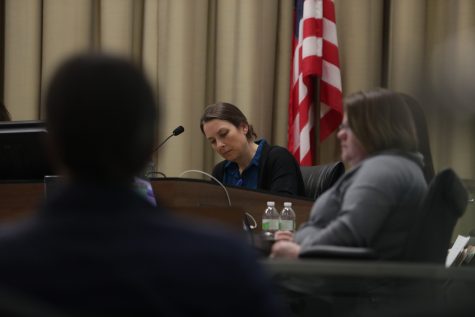UIHC grant will fund study of cognitive deficits in chemotherapy patients
With help from the American Cancer Society, UI researchers will be running a small study tracking objective changes in cognition to help create a basis for properly diagnosing the condition called “chemo brain.”
The University of Iowa Hospitals and Clinics building is seen from the west on Wednesday, Nov. 8, 2017.
December 12, 2019
“Chemo brain,” a loosely-defined phenomenon of cognitive impairments like memory loss, concentration difficulties, and multitasking challenges, will be investigated in patients undergoing chemotherapy treatments at the University of Iowa with a $25,000 grant from the American Cancer Society.
The condition does not affect everyone and tends to improve over long periods of time, said Sneha Phadke, Clinical Assistant Professor of Internal Medicine at the Carver College of Medicine, but it still takes a notable toll on a patient’s quality of life.
According to the National Cancer Institute website, recent studies into chemo brain have put a focus on breast cancer survivors, which has reported anywhere from 17 to 75 percent of survivors feeling cognitive deficits six months to 20 years after treatment.
“In the case of cancer, there seems to be some evidence that perhaps chemotherapy drugs that are given to cancer patients may have some role in causing some form of cognitive impairment,” said Kanchna Ramchandran of the department of neuroscience in the UI graduate college.
Phadke said there is no official diagnostic criteria for chemo brain and that the condition lacks robust evidence to support scientific understanding of it.
Ramchandran added that the existing evidence has produced conflicting results about patients’ experiences.
“I do have patients that feel that they have deficits in memory, decision-making, ability to multitask, and concentration, which are all very for doing day-to-day activities as well as successfully being able to work,” Phadke said.
Phadke said patients that are still working seem to be more affected by these cognitive deficits, and her interest in chemo brain stems from her experience as a clinician.
“Not being able to give patients a diagnosis is hard, because they want to know that this is what they have, and also because it’s confounded by things like anxiety, sleep changes, depression, and normal aging,” Phadke said.
Some of the difficulty in dealing with patients who may be experiencing chemo brain lies in the fact that, even if a diagnosis could be given confidently, there is no existing treatment regimen for the condition.
“Part of the grant that we have with the [American Cancer Society] is actually looking at a potential treatment option for chemo brain in addition to trying to better develop criteria for diagnosis,” Phadke said.
While there is not currently an established treatment regimen, conventional advice for those with cancer is still given as a remedy, Ramchandran said.
“Researchers around the world have tried things like cognitive training and brain-training programs. Interventions for improvements of quality of life with cancer like nutrition and exercise is recommended routinely,” Ramchandran said.
Ramchandran said the research will include neuroimaging non-invasive brain stimulation on ten patients with hopes of finding biomarkers and improvements in cognitive functioning after eight weeks of treatment.
Phadke stressed that the project they are undertaking has a uniqueness of their study into to chemo brain.
“Most funding is still going toward finding treatments to improve the clinical outcomes for our patients with breast cancer. There’s not as many people doing research in supportive care in cancer treatment, trying to improve the side effects and toxicity of chemotherapy treatment,” Phadke said.
Phadke said that, while chemotherapy is still a mainstay in breast cancer treatment, it is not administered as often as it way 10 to 20 years ago due to improved testing to see who will benefit more from chemotherapy.
“It’s important to not only increase patients life span but to make that life quality so that they aren’t dealing with the side effects of their treatment for the rest of their lives,” Phadke said.




















